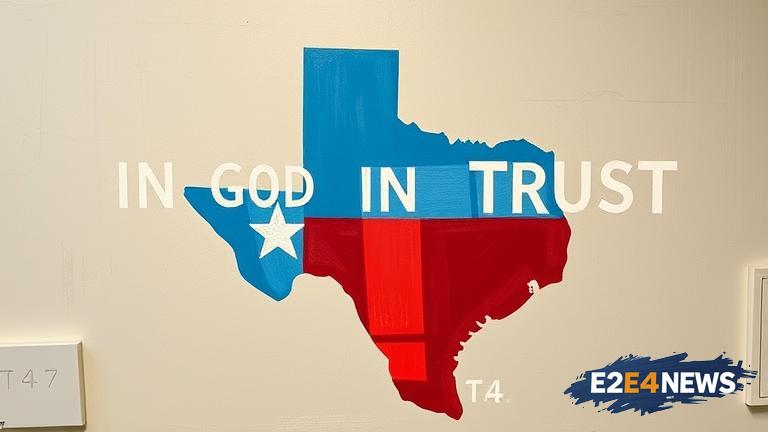The state of Texas has recently directed its schools to display the national motto ‘In God We Trust’ in a prominent location, as per a new law that came into effect. This move has sparked a heated debate among educators, parents, and lawmakers, with some arguing that it promotes religion and others seeing it as a way to instill patriotism in students. The law, which was passed in June, requires schools to display the motto in a conspicuous place, such as a hallway or cafeteria, where students and staff can see it. Proponents of the law argue that it is a way to promote American values and unity, while opponents claim that it violates the separation of church and state. The American Civil Liberties Union (ACLU) has expressed concerns that the law may be unconstitutional, as it could be seen as promoting a particular religion. However, supporters of the law argue that the motto is a national symbol that has been used for decades and is not specific to any one religion. The Texas Education Agency has stated that schools will be required to comply with the law, but has not provided guidance on how the motto should be displayed. Some schools have already begun to display the motto, while others are waiting for further guidance. The debate over the display of the motto has sparked a wider conversation about the role of religion in public education. Some argue that religion has no place in public schools, while others believe that it is an important part of American culture and history. The issue has also raised questions about the potential impact on students who do not identify with the Christian faith. As the debate continues, it remains to be seen how the law will be implemented and what the long-term effects will be. The display of the motto has been met with mixed reactions from students, with some seeing it as a positive message and others feeling uncomfortable or excluded. The law has also sparked a discussion about the importance of inclusivity and diversity in public education. Some educators have expressed concerns that the display of the motto may create a hostile environment for students who do not identify with the Christian faith. Others have argued that the motto is a reminder of the country’s founding principles and values. The issue has also been taken up by lawmakers, with some calling for the law to be repealed or amended. As the debate continues, it is clear that the display of the ‘In God We Trust’ motto in Texas schools will remain a contentious issue for some time to come. The law has sparked a wider conversation about the role of religion in public education and the importance of inclusivity and diversity. It remains to be seen how the law will be implemented and what the long-term effects will be. The display of the motto has raised important questions about the balance between promoting American values and respecting the rights of all students, regardless of their faith or background. The issue is likely to continue to be debated in the coming months and years, as educators, lawmakers, and the wider community grapple with the implications of the law. In the meantime, schools in Texas will be required to comply with the law and display the ‘In God We Trust’ motto in a prominent location. The law has also sparked a discussion about the potential impact on the state’s education system and the wider community. Some have argued that the display of the motto will have a positive impact on students, promoting patriotism and a sense of national unity. Others have expressed concerns that it will create a divisive environment and undermine the principles of inclusivity and diversity. As the debate continues, it is clear that the display of the ‘In God We Trust’ motto in Texas schools will remain a contentious issue for some time to come.
